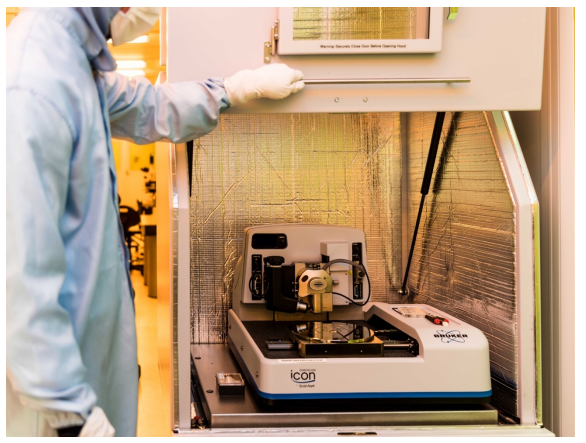Archer Materials Limited is pleased to announce the Company has reached a significant technological milestone in progressing its 12CQ technology that aims to build a room-temperature quantum computing qubit processor (“chip”). Archer is one of very few companies globally that provides investors a direct, on-market opportunity to invest in quantum computing technology.
 Archer staff operating the specialised, state-of-art conduction atomic force microscopy instrumentation required to perform the measurements. The instrumentation is housed in a chip prototype foundry with a cleanroom environment and sterile protocols.
Archer staff operating the specialised, state-of-art conduction atomic force microscopy instrumentation required to perform the measurements. The instrumentation is housed in a chip prototype foundry with a cleanroom environment and sterile protocols.
Highlights
- Significant technological milestone achieved towards building an operational room-temperature qubit processor (“chip”) prototype.
- State-of-art measurement confirms room-temperature conductivity of a single qubit component (“qubit”), representing a global competitive advantage in the multibillion-dollar quantum computing industry†.
- The room-temperature conductivity potentially enables direct access to the quantum information stored in the qubits.
- Archer’s qubit material has a significant commercial advantage over other competing qubits that rely on insulating materials, such as diamond materials or photonic architectures, that are difficult to integrate onboard portable devices.
- Chip build is advancing, with prototype development involving world-first quantum measurements and information control in qubits.
Room-temperature conductivity measurement on single qubit components
Conductivity measurements (“measurements”) on single qubit components (“qubits”) were carried out by Archer staff using conductive atomic force microscopy that was configured using state-of-the-art instrumentation systems, and housed in a semiconductor prototype foundry cleanroom (Image 1).
Commenting on the Company’s 12CQ development, Archer CEO Dr Mohammad Choucair said: “We have successfully performed our first measurement on a single qubit component, which is the most important component, marking a significant period moving forward in the development of Archer’s 12CQ quantum computing chip technology.
“Building and operating the 12CQ chip requires measurements to be successfully performed at the very limits of what can be achieved technologically in the world today. Directly proving room-temperature conductivity of the 12CQ chip qubit component solidifies our global competitive advantage and advances our development towards a working chip prototype”.
ASX Release: https://www.asx.com.au/asxpdf/20200615/pdf/44jn1gr0wf69bb.pdf